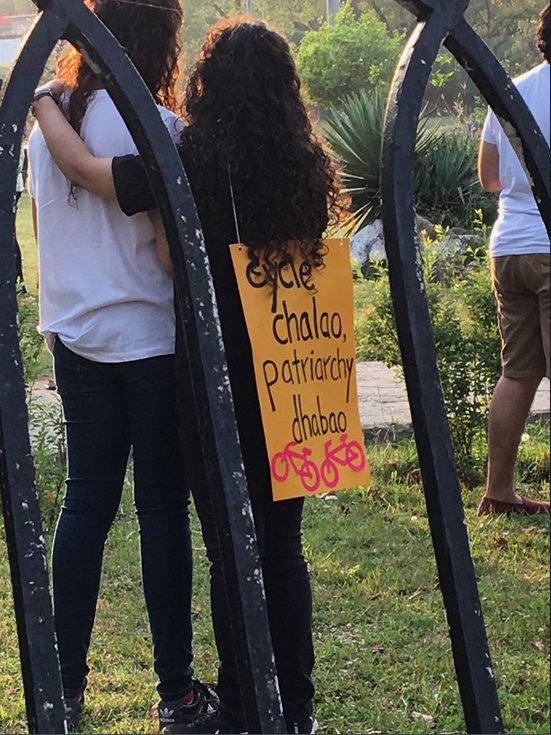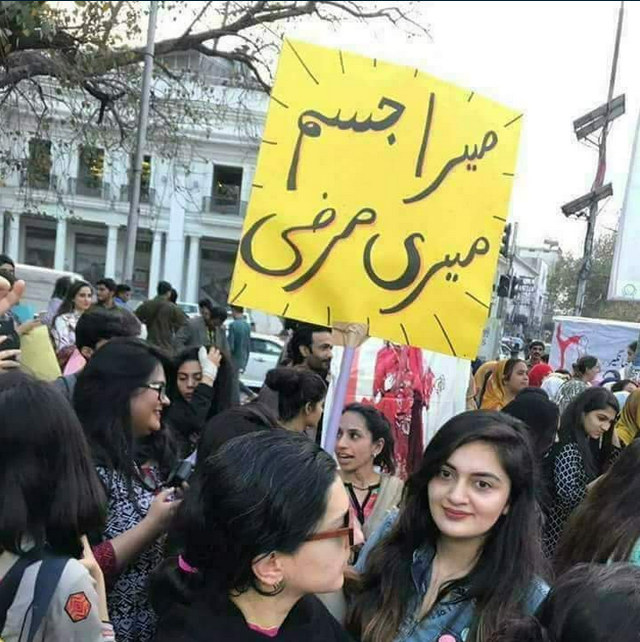ISLAMABAD, Pakistan (ViaNews) - Over the last few months, Pakistani's women have been protesting in the streets to fight for their rights. Women in Pakistan are demanding more freedom and gender equality in what relates to household responsibilities, and equal testimony right in court. In Pakistan, and according to Islam, the testimony of two women is considered equal to one man's witness.
The campaign is led by NGOs like All Pakistan Women Associating (APWA) and Women Action Forum (WAF), societies fighting for the women's rights in Pakistan. In a recent protest in the capital city, Islamabad, women are coming from other provinces to join hands.
Women have been protesting in the streets of Islamabad hold signs reading: "My body my choice", "Cook your food yourself", "My body is not your battlefield", among others. The Pakistani government has already reacted declaring that women should wear customized clothes and adopt their lifestyle as other women do in the Western culture. Pakistani rules allow every woman to wear clothes according to personal wishes, but it excludes wearing short clothing with the purpose to show off or bad intend.
[caption id="attachment_3988" align="aligncenter" width="551"]

Women around Pakistan are on roads using bicycles to reclaim their space and normalise girls riding bicycles. Islamabad. The sign reads: "Cycle chalao, patriarchy dhabao" in English: "Drive cycle and overrule the instructions by the family head". Most of the man don't allow their females to drive bicycle. Photo by: Faran Rafi.[/caption]
Pakistani women demands are reasonable to a part of the Pakistan society, while another part considers the recently demanded women rights to be against Islamic teachings. Muslim scholars said that they would not let anyone go against secular Islamic rules. According to the same Muslim scholars, this movement is dangerous for the Muslim Ummah (Muslim community) and will destroy Islamic values and tradition.
The Pakistani Islamic religious scholars, called Molvi, agree that some of the demanded women's rights would lead them astray, promoting moral abuse and sexual harassment cases. The Molvi community believes some unknown elements want to harm Islam and Muslims, wanting to establish an atmosphere of insecurity and imbalance in Pakistan.
[caption id="attachment_3992" align="aligncenter" width="640"]

Pakistan women’s rights rally. The sign reads: "Mera jism meri merzi", in English "My body, my choice". Photo by: Maaz Qureshi.[/caption]
Woman activist and Pakistani actress, Mahira Khan, said in an interview: "Equal rights for women can’t be ignored. They don’t have equal opportunities in education, jobs, and in planning their future according to their interest. Woman’s career and professional growth are as important as that of a man. But this thing is to understand that women should never go against Islamic rule of law"
Understanding Islam rules towards women
Islam orders a woman to put on a veil when she gets out of the house and goes to public places. Doing so is necessary for her and her family's respect as it saves her from bad intentions and evils from the people. Islam is not against freedom of women and never dictates any rule pertaining to slavery.
According to Islamic and Pakistani rules, it's the responsibility of a man to provide subsistence to his wife and children. That way, women need not go out of home to earn money for her family. Also, a woman should take care of household works and be ready to welcome and provide her husband with every convenience when he returns home from work.
All religions give primary importance to women's basic rights. According to the Islamic religion, Islamic rules are flexible enough and are practised for the esteem and safety of women in society. These rules guarantee the family system and thus set the foundation of a society based on spiritual and moral values.
 Women around Pakistan are on roads using bicycles to reclaim their space and normalise girls riding bicycles. Islamabad. The sign reads: "Cycle chalao, patriarchy dhabao" in English: "Drive cycle and overrule the instructions by the family head". Most of the man don't allow their females to drive bicycle. Photo by: Faran Rafi.[/caption]
Pakistani women demands are reasonable to a part of the Pakistan society, while another part considers the recently demanded women rights to be against Islamic teachings. Muslim scholars said that they would not let anyone go against secular Islamic rules. According to the same Muslim scholars, this movement is dangerous for the Muslim Ummah (Muslim community) and will destroy Islamic values and tradition.
The Pakistani Islamic religious scholars, called Molvi, agree that some of the demanded women's rights would lead them astray, promoting moral abuse and sexual harassment cases. The Molvi community believes some unknown elements want to harm Islam and Muslims, wanting to establish an atmosphere of insecurity and imbalance in Pakistan.
[caption id="attachment_3992" align="aligncenter" width="640"]
Women around Pakistan are on roads using bicycles to reclaim their space and normalise girls riding bicycles. Islamabad. The sign reads: "Cycle chalao, patriarchy dhabao" in English: "Drive cycle and overrule the instructions by the family head". Most of the man don't allow their females to drive bicycle. Photo by: Faran Rafi.[/caption]
Pakistani women demands are reasonable to a part of the Pakistan society, while another part considers the recently demanded women rights to be against Islamic teachings. Muslim scholars said that they would not let anyone go against secular Islamic rules. According to the same Muslim scholars, this movement is dangerous for the Muslim Ummah (Muslim community) and will destroy Islamic values and tradition.
The Pakistani Islamic religious scholars, called Molvi, agree that some of the demanded women's rights would lead them astray, promoting moral abuse and sexual harassment cases. The Molvi community believes some unknown elements want to harm Islam and Muslims, wanting to establish an atmosphere of insecurity and imbalance in Pakistan.
[caption id="attachment_3992" align="aligncenter" width="640"] Pakistan women’s rights rally. The sign reads: "Mera jism meri merzi", in English "My body, my choice". Photo by: Maaz Qureshi.[/caption]
Woman activist and Pakistani actress, Mahira Khan, said in an interview: "Equal rights for women can’t be ignored. They don’t have equal opportunities in education, jobs, and in planning their future according to their interest. Woman’s career and professional growth are as important as that of a man. But this thing is to understand that women should never go against Islamic rule of law"
Pakistan women’s rights rally. The sign reads: "Mera jism meri merzi", in English "My body, my choice". Photo by: Maaz Qureshi.[/caption]
Woman activist and Pakistani actress, Mahira Khan, said in an interview: "Equal rights for women can’t be ignored. They don’t have equal opportunities in education, jobs, and in planning their future according to their interest. Woman’s career and professional growth are as important as that of a man. But this thing is to understand that women should never go against Islamic rule of law"

